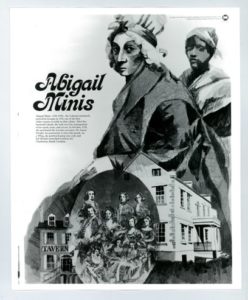Abigail Minis and Jewish Settlers in the Georgia Colony
Within six month of the founding of the Georgia Colony by James Oglethorpe in 1732, a ship carrying 42 Jewish settlers landed off the coast of Savannah. These Jews sailed from London, England, though most of them had Portuguese Jewish descent (refugees of the Spanish Inquisition), though there were among them two German-Jewish families, as well. They founded the third-oldest synagogue in the U.S. today – Congregation Mickve Israel – which was granted legal status in 1790. Among these Jewish settlers was a name we remember to this day: Abigail Minis.
Born August 11, 1701, Abigail Minis arrived in Savannah with her husband and two young daughters; between 1733 and 1757, she gave birth to eight more children. At the age of fifty-five, her husband died and Minis was left with these children to support alone. A sharp business acumen on her head, Minis grew a small fortune in the colony. She owned property in four counties, substantial sheep and cattle, and enslaved individuals to run her large and growing plantation. Some historians have noted that Jewish immigrants to the American North and the American South assimilated into very different cultures during the colonial period.
In 1963, Minis endeavored to open and operate a tavern, which she ran with her daughters until 1779. The tavern became a site for “elegant entertainments” for Georgia elites – a conglomeration which included judges, members of the governor’s council, wealthy merchants, and members of the Georgia Assembly. During the American Revolution, Minis provided provisions for the Continental line, Georgia militia, and stationed French forces. Following the fall of Savannah to the British in December 1778, loyalists acted to seize her property. Minis and her daughters successfully petitioned the governor, Sir James Wright, for passage to Charleston, which he granted. Minis and the governor also ensured the safekeeping of her property through the end of the war. As a Whig, she preferred going into exile and left British-controlled territory for Charleston, South Carolina. She returned to Savannah in 1783 and resumed her businesses until her death in 1794 (at the age of 93).


